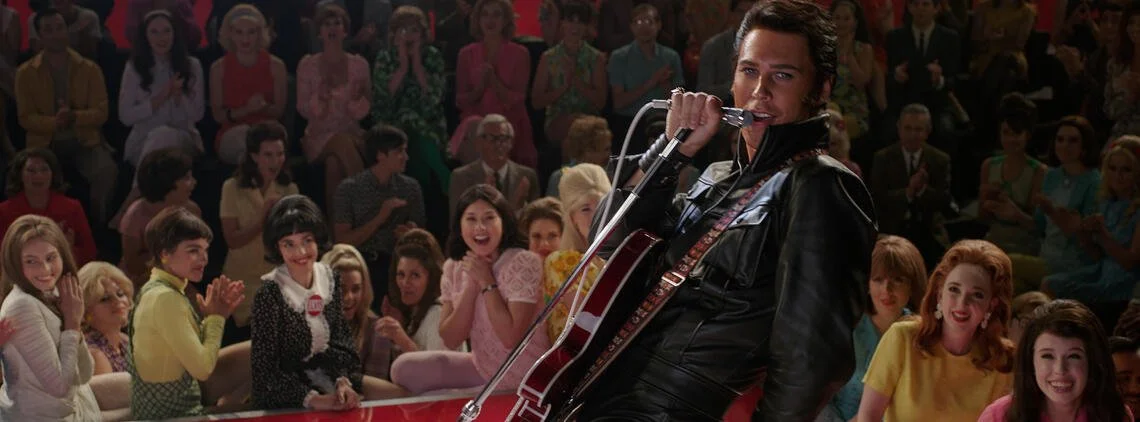“Elvis” Review: Just as Messy and Exhilarating as The “King” himself
Elvis (2022)
Elvis Presley was unorthodox and revolutionary. He broke down walls, changing the entertainment industry with his hips and stage presence. Baz Luhrmans’s 2022 biopic Elvis, aims to act as a mirror for Presley’s essence with almost psychedelic and slightly outrageous effects, but the theatrics do not always speak for themselves, leaving the audience feeling dazed and confused.
Luhrmann is quite possibly the most obvious choice to have directed a film following the eccentricity of the “King”. Luhrman has directed his share of films such as The Great Gatsby (2013) and Romeo + Juliet (1996), usually better received by the general public than critics, and Elvis is no exception. The anticipation for this biopic had been building since 2019 and although it received an 8 minute standing ovation at the Cannes Film Festival, many of the reviews were unimpressed with its lack of momentum; it seemed to have fallen flat, despite all the theatrics.
Watching Elvis felt like a rollercoaster; the film had so many thrilling moments, but they made the less glamorized scenes seem so much slower in comparison. Much of this can be attributed to the phenomenal performance from Austin Butler who embodied Presley’s stage presence in every scene. Butler exuded mastery and magnificence through the screen, audiences and critics alike declaring Butler a living, breathing Elvis.
When returning home from the theater, I couldn’t help but delve into my own exploration of Presley’s past performances, and to say that Butler embodies him would be an understatement. His gesture, choreography, and stature have revived the “King of Rock and Roll” from the archives into a new generation.
Unfortunately, Butler’s excellence is not consistent with everyone in the cast. Tom Hanks takes on an accent that is incomprehensible and ever-changing which might have been forgivable, other than the fact that his character, Colonel Parker, is the beginning, middle, and end of the film’s narrative. This may have been the most disappointing aspect of Elvis. His narration did not add any sense of consistency to the film. If anything, it was a distraction that took away from the story rather than adding to it. Parker’s character also felt undeveloped, not having the depth to be an unreliable narrator despite the attempt to act as one. The layers of Hanks’ prosthetics took away much of the details of his expression, resulting in a shallow performance.
One could argue that the most important part of an Elvis biopic should be music, and Luhrmann’s depiction of Presley’s appreciation for it is shown through emotive and cathartic encounters with various genres and people. However, what seems to be a tribute to rock and roll’s origins in black culture is, at times, done hastily and tastelessly.
Elvis makes sure to emphasize the importance of understanding rock and roll’s roots in gospel music and rhythm and blues. We see and hear from legends like BB King, Sister Rosetta Tharpe, Big Mama Thornton, and Little Richard whose music all paved the way for Presley’s success. There is definitely beauty found in the credit given to black artists, especially because many do not know that a majority of his songs were originally written by these artists who were not given the publicity that Presley, as a white man, was able to profit off of.
And yet, there are also aspects of the film’s dealings that were presented with less prestige. Shots of Presley on stage and ready to bend all the rules are intertwined by jump cuts to a confederacy meeting occurring in the same town. A huge confederate flag can be seen in the background, right as Presley is about to sing “Trouble” and be arrested for his lewd behavior on stage. Martin Luther King’s death is announced on television and affects Presley immensely, acting as a catalyst for further character development without any prior mention of him throughout the film. Conversations about race and sex cannot be avoided in a biopic pertaining to a figure so determined to break the norms, yet in instances like these they felt quite cheap, used for the melodramatics.
Elvis is messy and chaotic, but neither the intense direction nor tedious dialogue can break what holds this film together. At its core, Elvis is everything that the “King of Rock and Roll” embodied; he was full of passion and drive, but he was also human. A person who wanted it all and got halfway to it. I cannot help but think that Presley himself would have loved this film in all its glamor, extravagance, and grandeur. In many ways, there lies a sense of comfort in the fact that Elvis is just as controversial and complicated as he was.


